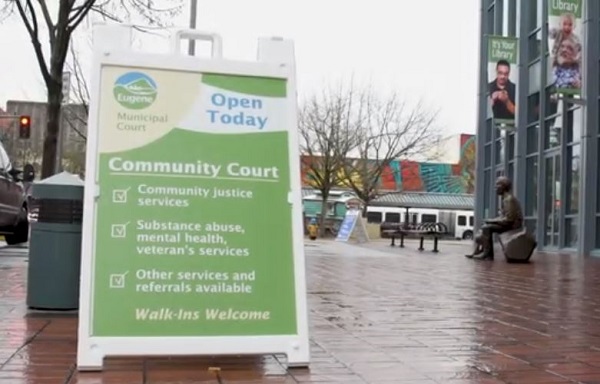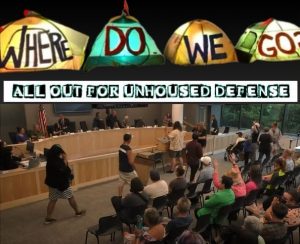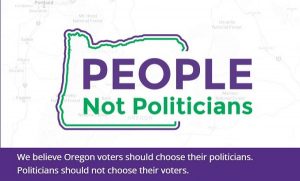Community Court wins $600K grant to reduce crime by providing shelter, stability, services
4 min read
by Caitlin Wallace, Eugene City Manager’s Office
A new Eugene Community Court program funded by a federal grant aims to unravel a toxic knot of homelessness, minor offenses, and community safety impacts.
The project connects shelter and targeted support to some unhoused individuals charged with misdemeanors like trespassing, disorderly conduct, criminal mischief, and other nonviolent charges.
The goal will be to create personal stability and disrupt behaviors detrimental to the community, consistent with the court’s core mission—to promote responsibility in participants through a combination of supervised community service and direct connections to social service providers.
Participants will be identified by court staff and the court’s local service providers using assessments that consider prior conviction and other life factors and needs.
“This is so important because it breaks up a vicious circle,” said Court Administrator Sarah Callegari. “People get stuck in a cycle of repeating minor offenses, which is bad for them and for the community. With no safe, stable place to live, along with the issues they’re dealing with, it’s almost impossible to attend appointments, follow-up on court directions, and get the care they need to stabilize so they can live a healthier life, and the community can be a safer place.”
A Eugene Municipal Court program, the Community Court is a collaborative response by public safety representatives, community members, and service providers to address the underlying challenges that may lead to criminal behavior, and give the justice system meaningful options to handle lower-level offenses.
A team of justice system and social service professionals problem-solve with community members in need of assistance and connect them with services that will address their needs and help them move out of the criminal justice system and toward an improved quality of life.
Community courts are founded on evidenced-based practices, problem-solving, accountability, community engagement, and alternatives to incarceration.
The four-year, $600,000 grant from the federal Bureau of Justice Assistance was awarded in October of 2022, but Community Court only received initial grant funds a few months ago and is now finalizing contracts with local service providers.
Up to 16 grant program participants at a time will stay at a Safe Spot shelter at Roosevelt Boulevard and North Garfield Street, one of the city’s “Rest Stop” locations run by Community Supported Shelters. Program participants should begin moving into the Safe Spot in the next few weeks.
As part of the grant, Laurel Hill Center will provide case management to program participants, providing a “one stop” interface for enrolling in support programs, getting medical care, attending appointments, meeting court expectations, and other needs.
Laurel Hill and Community Supported Shelters staff will work together to help keep residents on their path, which ideally will lead to placements in permanent housing and support opportunities.
“It’s just more effective for people to connect with one provider,” Callegari said. “When people are trying to overcome these challenges, it increases the odds of success by having a safe and consistent place to stay, and a relationship with one provider who understands their situation and needs.”
Community Supported Shelters runs most of the city’s Rest Stop sites, which feature individual Conestoga huts, communal shared spaces, and program staff who help residents meet personal stability goals and develop a sense of community that helps them be more successful when they move into long-term housing.
The Rest Stops, along with Safe Sleep sites, Microsites, the Overnight Parking Program, and the Dusk-to-Dawn overnight drop-in shelter are city-funded shelter programs responding to the homelessness crisis by providing diverse types of shelter and support to produce better outcomes for the vastly different situations and needs of the unhoused community.
The city also partners with Lane County in funding the River Avenue Navigation Center. City shelter and support programs are part of the city’s Housing Implementation Pipeline, addressing the urgent community need for more housing of all types.
Eugene has more than 3,500 unsheltered people nightly on average, and around 1,000 shelter spaces.
“Pulling together the resources to help our community in a meaningful, ongoing way is a real challenge,” said Peter Chavannes, the city’s homeless systems policy manager. “This project is a great example of the city pursuing nontraditional funding and working with local providers to amplify and improve what we’re doing around homelessness in Eugene.”
Community Court and the Rest Stop program are funded by the Community Safety Payroll Tax. Funds help provide faster, more efficient safety responses, deter crime, connect people to services, engage and help at-risk youth, support more investigations and court services, and hold those who commit crimes accountable.




